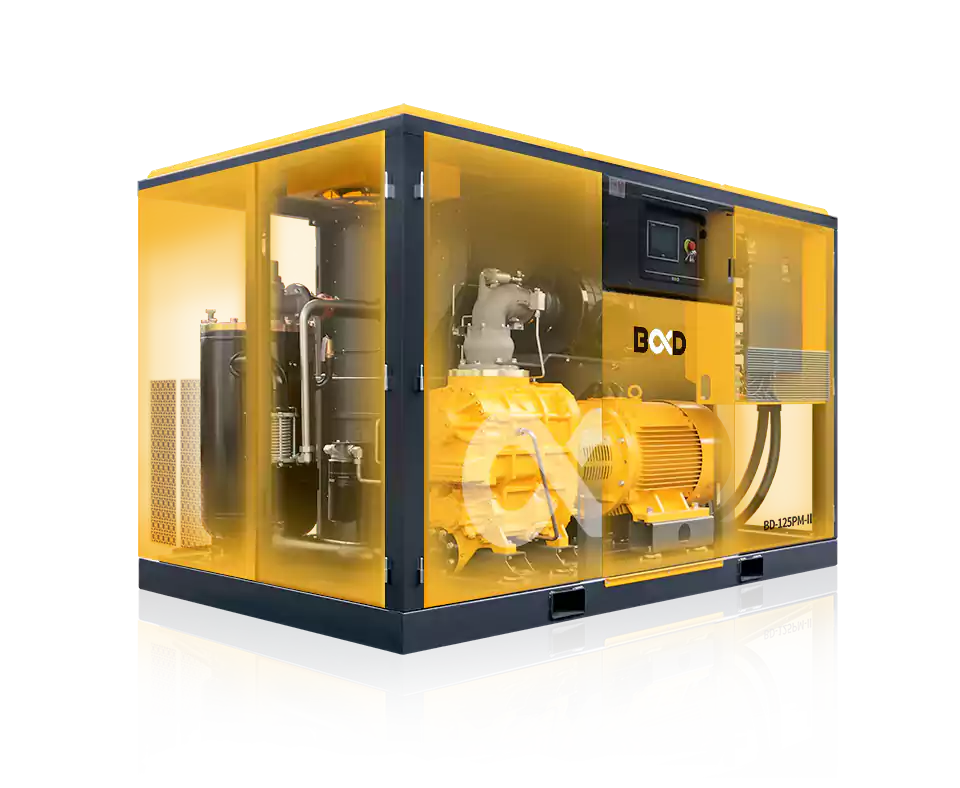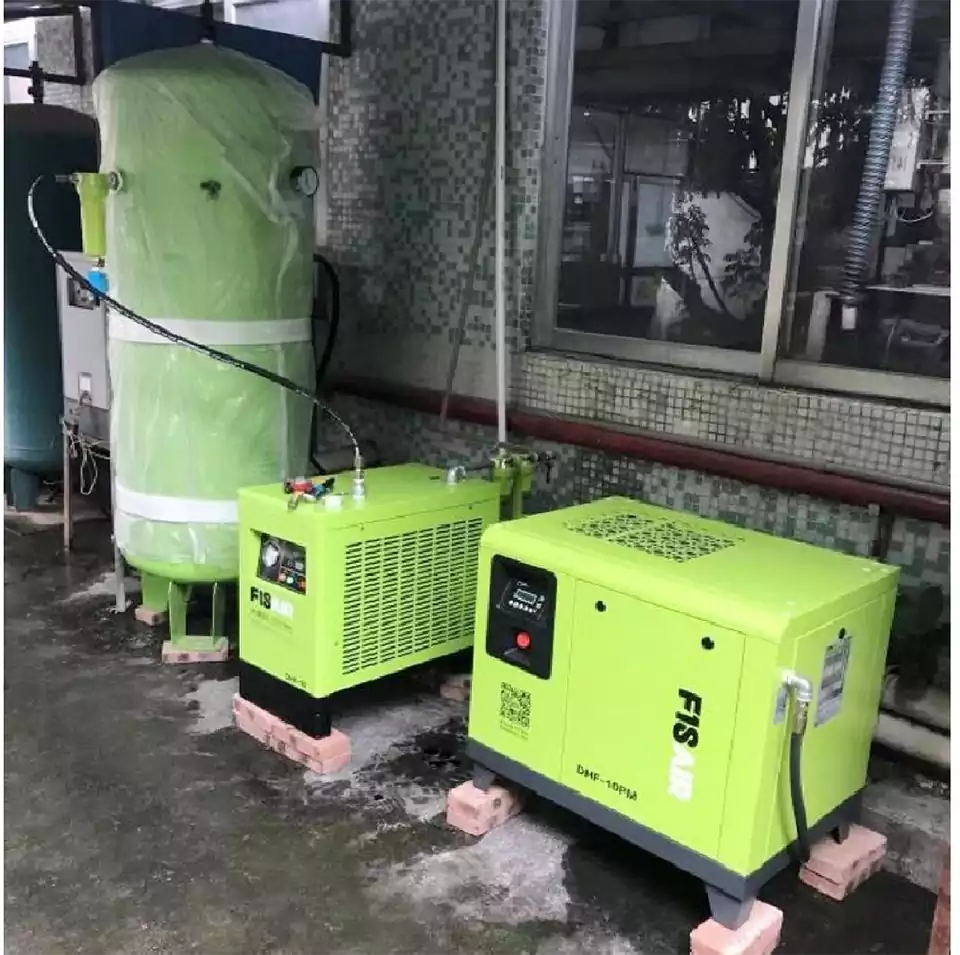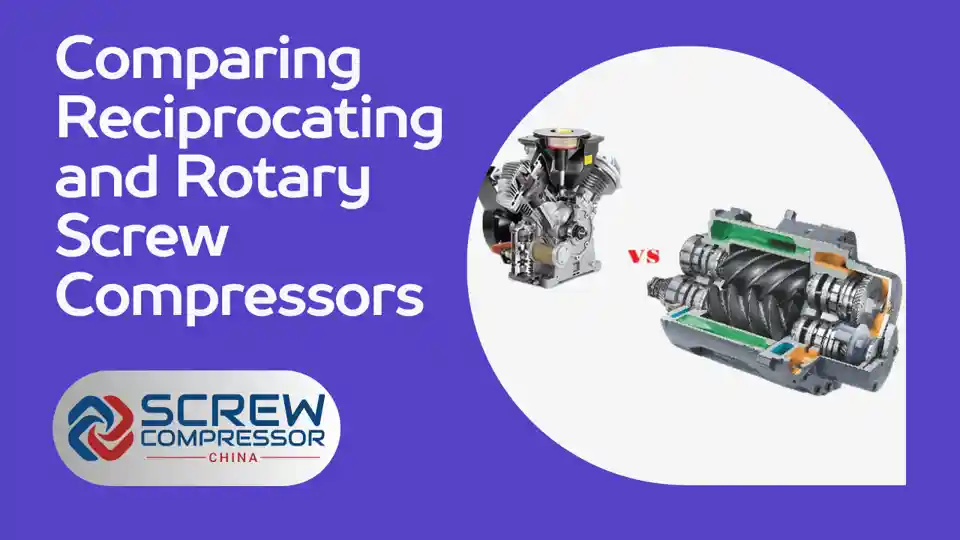When choosing an air compressor for industrial use, the decision often comes down to two main types: reciprocating and rotary screw compressors. Each type has its own set of advantages and considerations that can significantly impact their suitability for various applications. This detailed guide delves into the differences, performance aspects, and efficiency of these compressors to aid in making an informed decision.
Understanding Compressor Types
Reciprocating Air Compressors
Reciprocating compressors, often referred to as piston compressors, are characterized by their cyclical operation mode which utilizes pistons driven by a crankshaft to compress the air. They are traditionally used for applications requiring lower volumes of air delivered in intermittent bursts.
Due to their design, reciprocating compressors are generally less expensive and easier to maintain, making them suitable for smaller operations or lower duty applications.
Some key features of reciprocating compressors include:
- Ability to generate high pressures, even above 150 psi
- Suitable for intermittent use with lower CFM requirements
- Can be single-stage or multi-stage for higher efficiency
- Available in lubricated or oil-free designs
- Relatively low initial cost and simple maintenance
Rotary Screw Compressors
On the other hand, rotary screw compressors utilize two meshing helical screws, known as rotors, to compress the air. Designed for continuous operation, these compressors are ideal for applications requiring a constant air supply at high volumes.

They offer benefits in terms of efficiency and durability, particularly in industrial settings where compressed air is critical.
Rotary screw compressors are characterized by:
- Continuous airflow and 100% duty cycle capability
- Higher CFM per horsepower compared to reciprocating
- Fewer moving parts leading to less wear and maintenance
- Quieter operation and cooler running temperatures
- More efficient, especially with variable speed drive (VSD) models
Performance and Efficiency
Efficiency Comparison
Rotary screw compressors typically offer a higher level of efficiency in continuous use environments due to their ability to operate 24/7 without a drop in performance. This is particularly evident in their variable-speed models, which adjust the motor speed to match the air demand, significantly reducing electricity consumption.
A study comparing isentropic efficiency, the new standard for overall compressor efficiency, found that rotary screw compressors can achieve efficiencies up to 91%, while reciprocating models typically range from 75-85%. The higher efficiency translates to substantial energy savings in industrial settings with high compressed air demands.
Power Consumption
In terms of power consumption, reciprocating compressors may be more economical for businesses that need compressed air sporadically, as they consume power only when compressing air. However, for continuous operation, rotary screw compressors with variable-speed drives can be more cost-effective despite higher upfront costs.
Rotary screw compressors with VSD technology can reduce energy consumption by 35% or more compared to fixed-speed models. By precisely matching air output to demand, these compressors minimize wasted energy and optimize performance.

Choosing the Right Compressor
The choice between a reciprocating and a rotary screw compressor often depends on several factors including the desired airflow (CFM), duty cycle, operational costs, and maintenance requirements. Here’s a detailed comparison guide to help you understand which compressor type may be better suited for your specific needs.
Some general guidelines include:
- Reciprocating compressors are better for intermittent use, lower CFM needs (under 60 CFM), and applications requiring high pressures
- Rotary screw compressors excel in continuous operation, higher CFM demands (over 60 CFM), and offer better long-term cost efficiency
- Consider factors like noise levels, installation space, air quality requirements, and servicing costs when making your decision
Industrial Applications
For larger industrial applications that demand a continuous flow of air, rotary screw compressors are typically the preferred choice due to their robust performance and durability. The air receiver tanks used in these systems further enhance their performance by stabilizing the air output.
Industries that commonly rely on rotary screw compressors include:
- Manufacturing and assembly plants
- Food and beverage processing
- Pharmaceuticals and healthcare
- Automotive and transportation
- Mining and construction
- Agriculture and farming
- Power generation and utilities
Frequently Asked Questions
Q: What are the main advantages of rotary screw compressors?
A: Rotary screw compressors offer numerous advantages, including higher efficiency, greater reliability, and lower maintenance costs in high-demand environments. They are ideal for continuous operation and large-scale industrial applications.
Q: Can a reciprocating compressor be used for industrial applications?
A: While reciprocating compressors are suitable for smaller or medium-scale operations, their intermittent duty cycle makes them less ideal for heavy industrial use where continuous air supply is needed.
Q: What factors should be considered when choosing between a reciprocating and a rotary screw compressor?
A: Important factors include the volume of air required, the compressor’s duty cycle, energy efficiency, maintenance costs, and the overall operational demands of your facility.
By understanding the unique characteristics and operational efficiencies of reciprocating and rotary screw compressors, businesses can better determine the most appropriate air compressor technology for their specific needs. Whether you are operating in a light workshop setting or a heavy industrial environment, the right compressor can significantly impact productivity and operational costs.
Meta Description: Explore the differences between reciprocating and rotary screw compressors to choose the right type for your industrial needs. Understand efficiency, performance, and suitability for various applications.
